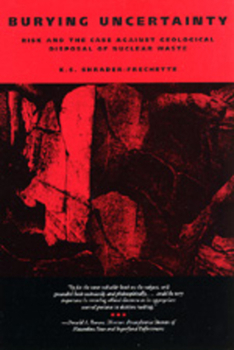Burying Uncertainty: Risk and the Case Against Geological Disposal of Nuclear Waste
Select Format
Select Condition 
Book Overview
Shrader-Frechette looks at current U.S. government policy regarding the nation's high-level radioactive waste both scientifically and ethically.
What should be done with our nation's high-level radioactive waste, which will remain hazardous for thousands of years? This is one of the most pressing problems faced by the nuclear power industry, and current U.S. government policy is to bury "radwastes" in specially designed deep repositories.
K. S. Shrader-Frechette argues that this policy is profoundly misguided on both scientific and ethical grounds. Scientifically-because we cannot trust the precision of 10,000-year predictions that promise containment of the waste. Ethically-because geological disposal ignores the rights of present and future generations to equal treatment, due process, and free informed consent.
Shrader-Frechette focuses her argument on the world's first proposed high-level radioactive waste facility at Yucca Mountain, Nevada. Analyzing a mass of technical literature, she demonstrates the weaknesses in the professional risk-assessors' arguments that claim the site is sufficiently safe for such a plan. We should postpone the question of geological disposal for at least a century and use monitored, retrievable, above-ground storage of the waste until then. Her message regarding radwaste is clear: what you can't see can hurt you.
What should be done with our nation's high-level radioactive waste, which will remain hazardous for thousands of years? This is one of the most pressing problems faced by the nuclear power industry, and current U.S. government policy is to bury "radwastes" in specially designed deep repositories.
K. S. Shrader-Frechette argues that this policy is profoundly misguided on both scientific and ethical grounds. Scientifically-because we cannot trust the precision of 10,000-year predictions that promise containment of the waste. Ethically-because geological disposal ignores the rights of present and future generations to equal treatment, due process, and free informed consent.
Shrader-Frechette focuses her argument on the world's first proposed high-level radioactive waste facility at Yucca Mountain, Nevada. Analyzing a mass of technical literature, she demonstrates the weaknesses in the professional risk-assessors' arguments that claim the site is sufficiently safe for such a plan. We should postpone the question of geological disposal for at least a century and use monitored, retrievable, above-ground storage of the waste until then. Her message regarding radwaste is clear: what you can't see can hurt you.
Format:Paperback
Language:English
ISBN:0520083016
ISBN13:9780520083011
Release Date:December 1993
Publisher:University of California Press
Length:368 Pages
Weight:1.26 lbs.
Dimensions:0.9" x 6.0" x 8.9"
Customer Reviews
1 rating
Questioning the Wisdom of Accumulating Radwaste
Published by Thriftbooks.com User , 17 years ago
Shrader-Frechette discusses the problem of radioactive waste, with primary emphasis on that originating from nuclear reactors. She also focuses on the proposed radwaste-storage site at Yucca Mountain, Nevada. The early part of the book is a description of the effects of radiation. For example, depending upon radiation exposure models, a single 10-rad exposure would cause anywhere between 560 and 10,630 excess cancers among one million exposed persons. (p. 35) The author elaborates on many of the uncertainties regarding long-term predictions of radwaste storage. And, using Yucca Mountain as an example, one must come to the sobering realization that the uncertainties can be nonlinear and interactive (p. 162) Shrader-Frechette dwells on the logical fallacies used by proponents of long-term safe radwaste storage. For instance, the appeal to ignorance posits that absence of evidence of problems means that there will be no problems. Then there is the appeal to authority. Authorities have been wrong before, notably in matters related to risk assessments of radiation (p. 156)






